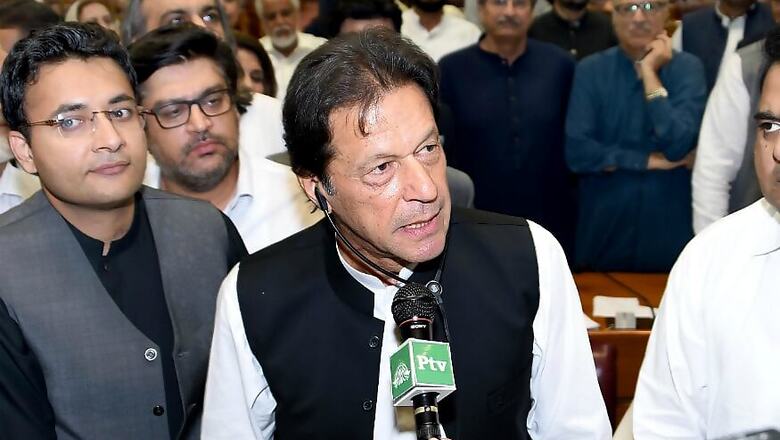
views
Islamabad: The IMF has expressed dissatisfaction at the current state of Pakistan's tax collection as the cash-strapped government sought a bailout package of up to USD 6 billion from the multilateral lender to overcome the economic challenges, media reports said Tuesday.
The cash-strapped Pakistani government led by Prime Minister Imran Khan is facing grave economic challenges as it struggles to keep the economy afloat. Last month, Saudi Arabia said it would provide Pakistan with a USD 6 billion rescue package, but officials have said it is not enough, and Islamabad still plans to seek a bailout from the International Monetary Fund (IMF).
Pakistan may ask the IMF for up to USD 6 billion, Geo News reported. If approved, it would be Pakistan's 13th rescue package from the multilateral lender since the late 1980s. Pakistan formally approached the IMF in October for loans.
An IMF team is currently reviewing Pakistan's monetary and fiscal policies as well as its monetary needs in keeping with the current account deficit.
On Monday, the delegation, which has already concluded the technical discussions with the Pakistani representatives, commenced its policy-level talks with ministers and representatives of the Federal Board of Revenue (FBR).
Members of the team, led by Harald Finger, a senior economist and an adviser to the IMF, further stressed on effective measures required to increase the tax collection in order for Pakistan to deal with and recover from its financial crunch and current account deficit, Geo News reported.
According to the report, the IMF also indicated its support towards the FBR's move to send notices to thousands of tax defaulters. There were two rounds of policy-level talks. During the first one, the IMF delegation met with Finance Minister Asad Umar and officials from the State Bank of Pakistan (SBP), whereas in the second, it met with the FBR representatives.
The IMF delegation was briefed on the tax collection target for the ongoing fiscal year as well as the financial performance during the first four months, starting July 1, 2018 (FY18-19). The IMF team said it was difficult to achieve the goal of curbing the financial crisis without increasing the tax collection, it quoted sources as saying. They also underscored the need to widen the tax scope.
The fund is reported to have raised questions over more than Rs 90 billion revenue shortfall in the first four months of the current fiscal year and wondered how the projected fiscal deficit target of 5.1 per cent could be achieved when development programme had already been curtailed to a bare minimum, Dawn newspaper reported.
The IMF is also dissatisfied over the performance of the power sector whose losses and recoveries are reported to have gone down rather than improving since the last IMF programme was completed in Sept 2016, leading to build up of circular debt beyond Rs 1.2 trillion and creating supply side constraints, it said.
Informed sources told the paper that the authorities briefed the IMF delegation about the subsidies envisaged in the 2018-19 budget and those committed by the Khan government since it came to power three months ago.
The discussions are set to continue till November 20, the report said. From November 7 when the IMF team arrived in Pakistan to November 9, technical talks were held, during which data pertaining to the performance of various sectors was presented.
The IMF team would also review the apex bank, SBP's financial independence and the FBR's performance, the report said.
IMF Managing Director Christine Lagarde has said that Pakistan has requested financial assistance from the IMF to help address the country's economic challenges.
At the same time, she said the IMF would require "absolute transparency" of Pakistan's debts, including those owed to China, apparently referring to the USD 60 billion China-Pakistan Economic Corridor (CPEC) projects.
The CPEC is a network of infrastructure projects that are currently under construction throughout Pakistan that will connect China's Xinjiang province with Gwadar port in Pakistan's Balochistan province. It is the part of Chinese President Xi Jinping's ambitious Belt and Road Initiative.
The US has said that the huge Chinese debt was responsible for the economic challenges facing Pakistan, adding that it will review Islamabad's bailout plea to the IMF from all angles, including the country's debt position.




















Comments
0 comment